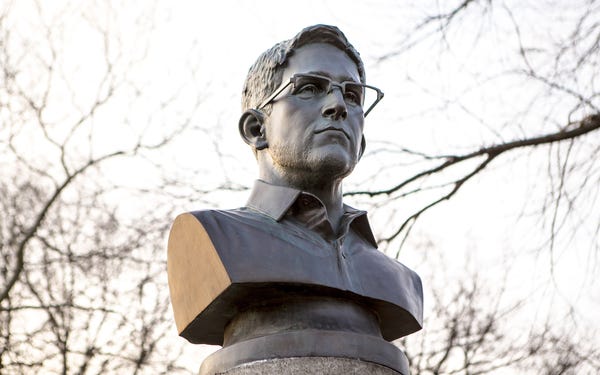Whistleblowers aren't going to save you (and neither is Obama)
Everybody loves a hero—but there aren't enough of them available.
Look, everyone’s looking for a hero right now, we get it. But we are not in hero territory anymore, Toto.
As a culture, we tend to either lionize or vilify the people who speak out—depends on which side of the story we sit. We know the names of people who’ve blown the whistle because they’ve exposed a truth that has sent ripples throughout American culture—or even changed the course of its history. War crimes, sexual crimes, mass surveillance, electoral interference have all been revealed by insiders. Heroes! Or to some, villains.
In reality, most of the hundreds of people we’ve worked with who have put themselves at risk to inform the public of a wrong don’t think of themselves as heroes (or villains), and the hero narrative sets up a black-and-white construct that doesn’t serve anyone. Insiders in America tell the world what they know because they believe they have to, often after finding themselves in a position where they couldn’t remain silent anymore. Lives and futures were at stake; sometimes many lives and many futures. More often than not, insiders feel a moral imperative to speak because the cost of not doing so would feel too overwhelming—whatever the cost to themselves.
And yes, we often herald them as heroes—because what they are doing is risky and brave! But what if we changed things to make “whistleblowing” less fraught, because “everyone is doing it!”? At a panel at SXSW London recently, two people who spoke out in the public interest — Zelda Perkins and Will Alpine — talked about how perceptions of whistleblowing in America need to change. Because if workers sharing information the rest of us ought to know are expected to be heroes, then there’s not going to be enough of them.
Another problem with putting people on a pedestal… ahem…

…is that it has an “othering” effect. As in, I’m seeing something wrong here, but I am not the type to take that on, e.g. someone else was born to do this.
“Speaking up takes courage, tenacity and a clear sense of right and wrong to stand up for integrity in a world where it is easier to turn a blind eye. Whistle-blowers expose themselves to extreme scrutiny and invite forensic examination of their character and motivation.” - Will Inge, whistleblower advocate
Insiders like Perkins, who was one of the first people to go on the record about Harvey Weinstein’s decades-long predations, and Alpine, who spoke out about the staggering scale of Microsoft's “Big Oil” AI contracts, have indeed faced major professional and financial consequences as a result of telling the truth. They know how high the price of whistleblowing can be. Jobs are lost, professional relationships are severed, financial security is sacrificed.
But, the fact is, no one person is going to save us. In this period of increasing unregulated corporate power and corruption, we need to diffuse risk and create a volume of transparency that generates the kind of collective power that only the masses (and remember, workers are the masses) can bring. So that it’s not necessary for any one person to “take the fall” and become the “villain.” That’s a lot for one person to bear.
That’s why there’s got to be a new way. Not everyone wants to be a hero, and not everyone can afford to make the sacrifices that heroes are often famously forced to make.
So how do we do this? First off, by offering protections to insiders who want to speak out. Congress passing the AI Whistleblower Protection Act, sponsored by Republican Senator Chuck Grassley, would be a good start. The bill provides anti-retaliatory protections to AI whistleblowers who want to report concerns about what they’re seeing in AI development (a field that’s so fast-moving that, honestly, insiders are probably the only people even half-capable of alerting us to potentially calamitous developments before it’s too late). This is really important, because if people have to blow up their livelihoods and careers for the rest of our safety, they really shouldn’t have to lose their job for that.
Then there’s our other favorite idea. When you collectivize whistleblowing, you spread, and effectively dilute, the risks and the costs associated with it—so that not all the weight of exposing fraud, lies, and freaking war crimes is going to have to lie on the shoulders of one single person. And spreading the risk also means spreading the power. As a Tressie McMillan Cottom put it recently:
"Everyday people standing between authoritarianism and our freedom scare the administration. They reveal the greatest informal mechanism for democratic enforcement: not kings, not former presidents, but the power of the people."
We need to gather people together by giving them the agency to act where the government is unable or unwilling to do so. We live in a democracy, right? (For now, anyway. 🙃) Maybe the key to keeping it one is by taking some of the power back into our own hands.





Well argued! I'm not sure that whistleblowers, much less loving Obama, can stop the AI-cizing of society, but I still think it's worth trying!